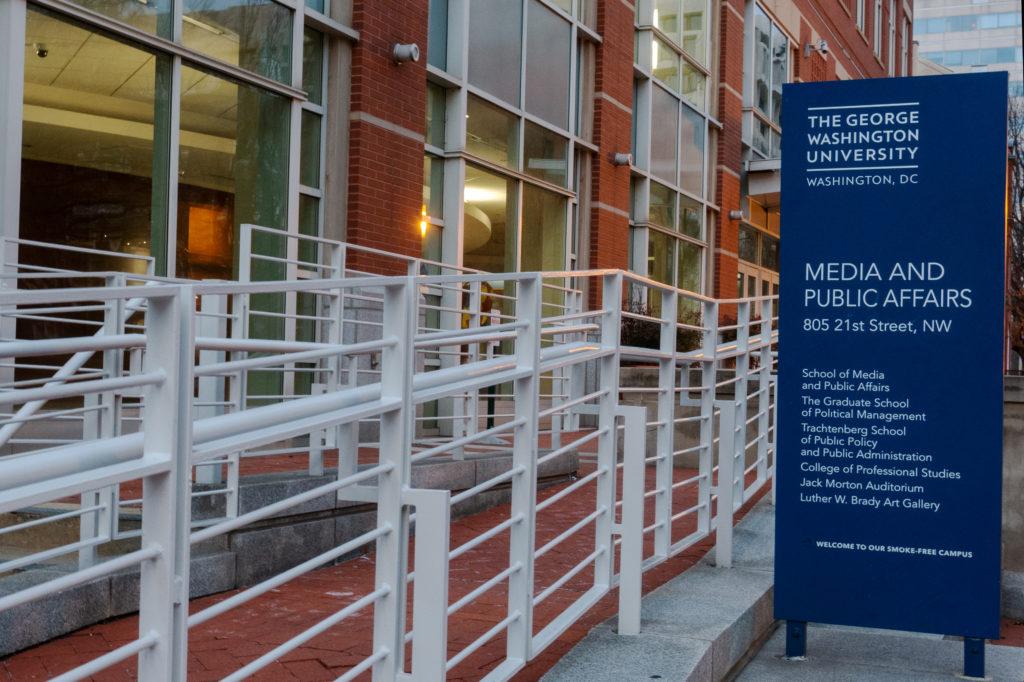Two experts in Iranian nuclear diplomacy discussed the likelihood and ramifications of Iran making a nuclear weapon Friday.
Sina Azodi, a professorial lecturer of international affairs at GW, and Naysan Rafati, a senior analyst at the International Crisis Group, said U.S. and Iranian tensions are at an all-time high, and the inconsistent policies of U.S. presidential administrations have harmed the country’s ability to contain Iran. The Eta Society for Global Affairs hosted the discussion at the School of Media & Public Affairs, moderated by the Society’s professional officer, Olivia Thompson.
Azodi said Iran’s nuclear program began in 1957 when it entered an agreement with the U.S. to share research on nuclear technology, primarily focused on improving peaceful nuclear power.
“I don’t think they knew why they wanted the nuclear program. It was simply given to Iranians,” Azodi said. “And the Shah thought that having a nuclear program is a symbol of Iran’s modernization which for him was Westernization of Iran.”
Azodi said following the Iranian Revolution in 1979, the relationship between Iran and Western powers grew more tense when the new regime canceled every existing nuclear agreement and began shifting its focus from nuclear power to nuclear bombs, marking the beginning of a long battle over Iran’s development of nuclear weapons.
“One of the Iranian negotiators put it, ‘The best defense is to go on offense,’” Azodi said. “Meaning that we can’t get anything by negotiations, so let’s go on the offense. Expand the nuclear program as much as we can, expand our bargaining chip, and then once we are in that stage, then we can negotiate.”
Rafati said the establishment of the Joint Comprehensive Plan of Action — the 2014 nuclear deal in which Iran agreed to dismantle part of its nuclear program and open facilities to international inspections — during President Barack Obama’s administration cooled tensions between the U.S. and Iran. He said when President Donald Trump’s administration withdrew from the JCPOA and increased sanctions, Iran started building up its nuclear capabilities again.
“The breakout time — which is the amount of time you need to have one weapon’s worth of fissile material — had dropped from 12 months under JCPOA to three months by the time the Biden administration took office,” said Rafati.
Rafati said people in the Iranian middle class tend to fare “much more poorly” under sanctions because the sanctions imposed by Western powers generally targeted working-class industries, like oil and steel. Rafati said some sanctions imposed by the U.S. have had the opposite effect of what was intended, like diverting work back to the Iranian regime.
“There was a lot of talk about these people that they would call the ‘merchants of sanctions,’ sanctioners essentially, that are benefiting,” Rafati said. “When international companies have had to pull out for major construction projects, who’s taking the contracts? Conglomerates related to the Revolutionary Guard. They charge more and do a much worse job.”
Rafati said sanctions put economic pressure on Iran but do little to stop the growth of its nuclear program since it can still make money by selling exports like oil to China. Rafati said the U.S. should refocus on pursuing a peaceful relationship with Iran instead of escalating tensions.
U.S. officials said they are preparing for a “significant” attack from Iran on Israeli or American assets this week following Israel’s strike on the Iranian consulate in Damascus, Syria last Monday that killed seven Iranian military officers.
“I would say that we need to redouble efforts towards diplomacy because that is ultimately the only thing that in the past 20 years has verifiably and in a long-term manner rolled back Iran’s nuclear program,” Rafati said.
He said the U.S. and Iran’s unwillingness to cooperate directly has played a large part in hindering negotiations. Rafati said Iranian diplomats are only willing to hold indirect talks with the U.S., meaning they consistently communicate through a third party.
“The fact that they were spending two years negotiating nuclear stuff indirectly is like Larry David sitcom material,” Rafati said. “Genuinely imagine trying to negotiate the finer points of sanctions relief via two mediators in a hotel next door.”
Azodi said the U.S. and other Western powers must tread carefully when negotiating the terms of a new nuclear deal with Iran, especially because the program has become increasingly advanced over the last few years.
“If you corner a cat, it might act differently from a cat roaming free,” Azodi said. “Meaning that if you corner Iran, they might decide that ‘Let’s go for the bomb.’”
Rafati said there is very little “diplomatic engagement” between Iran and the U.S. and the breakout time to build a bomb could be as short as less than a week.
“We’re at the point right now where there could be a small war over this weekend,” said Rafati.











